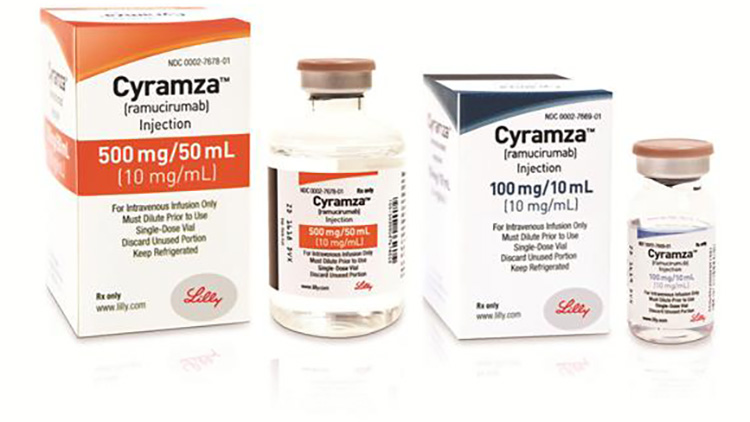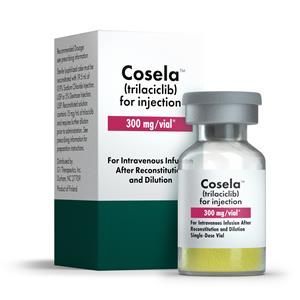Cyramza (ramucirumab) vs Cosela (trilaciclib)
Cyramza (ramucirumab) vs Cosela (trilaciclib)
Cyramza (ramucirumab) is a monoclonal antibody designed to target and inhibit the vascular endothelial growth factor receptor 2 (VEGFR2), which can help to slow the growth of new blood vessels that tumors need to grow and is primarily used in the treatment of certain types of lung, gastric, and colorectal cancers. On the other hand, Cosela (trilaciclib) is a cyclin-dependent kinase 4/6 (CDK4/6) inhibitor that protects bone marrow cells from damage caused by chemotherapy, and it is approved to decrease the incidence of chemotherapy-induced myelosuppression in adult patients when treating extensive-stage small cell lung cancer. When deciding which medicine is right for an individual, it is crucial to consider the type of cancer being treated, the specific treatment goals (such as tumor growth inhibition with Cyramza or protection of bone marrow cells with Cosela), and the overall treatment plan as determined by a healthcare provider.
Difference between Cyramza and Cosela
| Metric | Cyramza (ramucirumab) | Cosela (trilaciclib) |
|---|---|---|
| Generic name | ramucirumab | trilaciclib |
| Indications | Used for the treatment of certain types of gastric or gastroesophageal junction adenocarcinoma, colorectal cancer, hepatocellular carcinoma, and non-small cell lung cancer. | Used to decrease the incidence of chemotherapy-induced myelosuppression in adult patients when administered prior to a platinum/etoposide-containing regimen or topotecan-containing regimen for extensive-stage small cell lung cancer (ES-SCLC). |
| Mechanism of action | Monoclonal antibody that binds to vascular endothelial growth factor receptor 2 (VEGFR2) and blocks the VEGF/VEGFR pathway, inhibiting angiogenesis. | Cyclin-dependent kinase inhibitor that transiently arrests bone marrow cells in the G1 phase of the cell cycle, protecting them from damage by chemotherapy. |
| Brand names | Cyramza | Cosela |
| Administrative route | Intravenous infusion | Intravenous infusion |
| Side effects | Hypertension, diarrhea, headache, and stomatitis, among others. | Fatigue, hypocalcemia, hypokalemia, hypophosphatemia, increased aspartate aminotransferase, headache, pneumonia, among others. |
| Contraindications | Hypersensitivity to ramucirumab or any component of the formulation. | Hypersensitivity to trilaciclib or any component of the formulation. |
| Drug class | Monoclonal antibody, angiogenesis inhibitor | Cyclin-dependent kinase inhibitor |
| Manufacturer | Eli Lilly and Company | G1 Therapeutics, Inc. |
Efficacy
Cyramza (Ramucirumab) Efficacy in Lung Cancer
Cyramza (ramucirumab) is a monoclonal antibody designed to target and bind to the vascular endothelial growth factor receptor 2 (VEGFR2), which plays a role in the formation of blood vessels that supply tumors with nutrients and oxygen. In the context of lung cancer, specifically non-small cell lung cancer (NSCLC), Cyramza has been evaluated for its efficacy as a treatment option. The drug has been approved by the FDA for use in combination with docetaxel in patients with metastatic NSCLC who have seen disease progression during or after platinum-based chemotherapy. Clinical trials have demonstrated that this combination extends overall survival and progression-free survival compared to docetaxel alone, providing an additional option for patients with advanced NSCLC after initial treatment failure.
Cosela (Trilaciclib) Efficacy in Lung Cancer
Cosela (trilaciclib) is a cyclin-dependent kinase 4/6 (CDK4/6) inhibitor that has a unique approach to treating small cell lung cancer (SCLC). Rather than directly targeting the cancer cells, Cosela is used to protect the bone marrow from damage caused by chemotherapy. It is administered before chemotherapy to patients with extensive-stage SCLC. Clinical trials have shown that Cosela effectively reduces the occurrence of severe neutropenia, a common and serious side effect of chemotherapy that can lead to infections and interruptions in cancer treatment. By mitigating this risk, Cosela can help patients maintain their chemotherapy schedule, which is crucial for the treatment's efficacy.
Both Cyramza and Cosela represent advancements in the treatment of different types of lung cancer, addressing the disease from distinct angles. Cyramza, through its inhibition of angiogenesis, directly impacts tumor growth and survival, while Cosela offers a supportive care approach, aiming to reduce the impact of chemotherapy on the patient's bone marrow. The efficacy of these drugs in improving outcomes for lung cancer patients highlights the importance of continued research and development in oncology therapeutics.
It is important to note that the efficacy of these medications can vary based on individual patient factors, including the specific characteristics of the tumor, previous treatments, and overall health. As with any medication, the use of Cyramza and Cosela should be guided by a healthcare professional, taking into consideration the potential benefits and risks in the context of each patient's unique clinical situation.
Regulatory Agency Approvals
Cyramza
-
European Medical Agency (EMA), European Union

-
Food and Drug Administration (FDA), USA

-
Health Canada

-
Therapeutic Goods Administration (TGA), Australia

-
Medsafe (NZ)

Cosela
-
Food and Drug Administration (FDA), USA

Access Cyramza or Cosela today
If Cyramza or Cosela are not approved or available in your country (e.g. due to supply issues), you can access them via Everyone.org.
How it works

Make an enquiry
Choose the medicine you want to buy, answer a couple of questions, and upload your prescription to speed things up. We’ll get back to you within 24 hours.


Make an enquiry
Choose the medicine you want to buy, answer a couple of questions, and upload your prescription to speed things up. We’ll get back to you within 24 hours.


Breeze through the paperwork
We'll guide you through the required documents for importing unapproved medicine, ensuring you have all the necessary information.


Get a personalized quote
We’ll prepare a quote for you, including medicine costs and any shipping, administrative, or import fees that may apply.


Receive your medicine
Accept the quote and we’ll handle the rest - sourcing and safely delivering your medicine.

Some text on this page has been automatically generated. Speak to your physician before you start a new treatment or medication.
Let's talk
If you have any questions, call us or send us a message through WhatsApp or email:
Contact us




